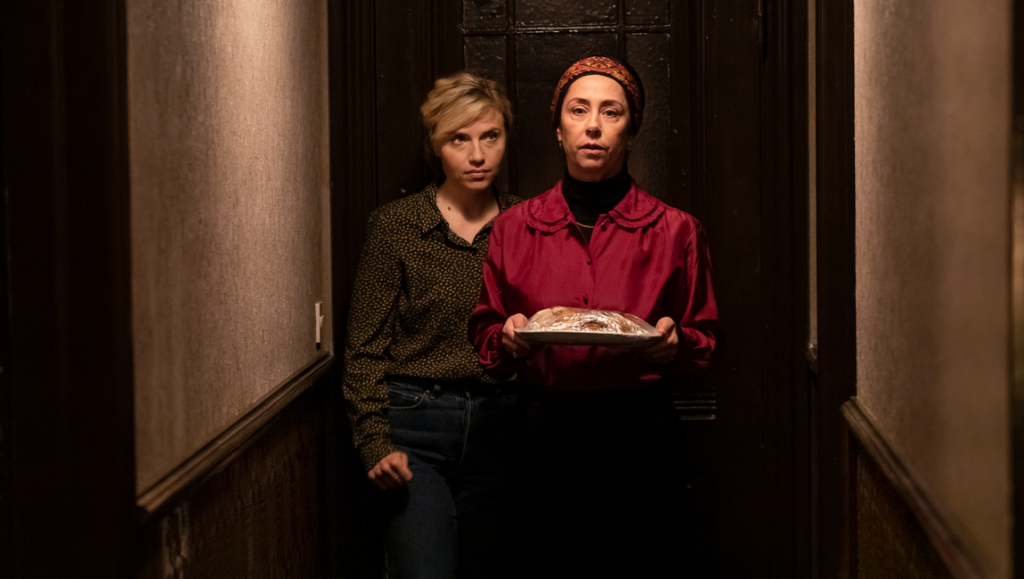Within the steadily growing niche genre of Jewish horror, there are two key tales that have a hold over the imagination of filmmakers. With a few notable exceptions — like Keith Thomas’ 2021 mazzik film The Vigil — most Jewish horror movies center either a golem or a dybbuk. The golem, a figure of strength, is an animated weapon of destruction, awoken to wreak revenge or protect the Jewish people from persecution; the dybbuk, on the other hand, is a far more complicated creature. To non-Jewish audiences, the instinct is to compare a dybbuk to a ghost, but while the dybbuk is the spirit of a once-living person, their behavior is more akin to demons, taking possession of the living in service of some agenda. For a culture with a long history of violent persecution, even to the extent of genocide, perhaps it’s obvious that an idea like that of the dybbuk would have a natural hold over minds. Since the early days of horror as we presently understand it, and the Gothic tradition stretching back centuries, these kinds of hauntings have afflicted women far more frequently than men. Female protagonists, trembling and frail or else entangled in their husbands’ and fathers’ dark pasts, were far more susceptible to the call of another world than their male counterparts, and the Gothic has always had a particular fascination with women’s interiority. When one of the seminal dybbuk texts, W.S. Ansky’s 2008 Yiddish-language play The Dybbuk, or Between Two Worlds, featured a woman as the victim of its titular dybbuk, Jewish horror concretely became part of the long, feminine tradition of hauntings and possession.
In Attachment, that tradition moves in a distinctly modern direction. An out-of-work Danish actress, Maja (Josephine Park), falls for Leah (Ellie Kendrick), a British academic, and follows her home to London to care for her after a seizure. Upon arriving in London, Maja meets Chana (Sofie Gråbøl), Leah’s overbearing mother, and discovers that there may be more to the pair than quite meets the eye. Writer-director Gabriel Bier Gislason’s script not only draws expertly from Jewish folklore, but also from Jewish stereotypes, capitalizing on the archetype of the overbearing Jewish mother, with Gråbøl’s performance lending an emotional turbulence to the role that many writers don’t tend to allow for. Chana is the sort of character who might otherwise be a footnote, but Attachment takes her ferocious maternal instincts entirely seriously, treating them not as mere inconvenience, but as a literal matter of life and death. Gislason might trade in tropes here, but he doesn’t do so carelessly, and when the Jewish-mother type is passed through his neo-Gothic lens, it loses something of its venomousness and becomes altogether more human. Gislason likewise riffs on the lesbian stereotype of U-hauling, the social phenomenon of gay women forming deep emotional attachments quickly to the point of moving in together almost immediately. But what might seem unconventional in the real world becomes deeply affecting in the world of Attachment — Maja is ready to follow Leah across an ocean at the drop of a hat, but does that kind of intense, quick-fire love survive under the pressure of supernatural forces? Attachment takes this theme to its logical extreme, arguing that to truly love a person you must know and love the full weight of their history as well, even if that comes in the form of a dybbuk, possessing body and soul.
Unlike most elevated horror nonsense, Attachment doesn’t wear such considerations entirely on its sleeve. Femininity is a constant presence, but the near-entire absence of men goes largely unnoticed, and Gislason doesn’t feel the need to have his characters discuss their faith or their trauma openly. Instead, he conjures an atmosphere of near constant low-level tension, with Maja constantly at odds with a community of orthodox Jews that has no desire for a queer Gentile among their ranks, and the lack of privacy in Leah’s home — just upstairs from her mother’s — replete with good-luck charms manifesting around the flat, all contributing to a constant sense of surveillance. In Attachment, haunting is something that occurs en masse, with an entire community dragged into the orbit of one family’s misfortune, and despite the relative sparsity of the cast, this community-driven context only builds the characters’ sense of insularity. Put simply, this is a story that couldn’t be told against any other backdrop, and Gislason permeates not just the home or the individual psyche, but entire relationships with this notion of possession, coloring each of the film’s even minor interactions with as much purpose as character’s sexualities or traumas. While scares may admittedly be a little thin on the ground, Attachment represents an exciting step for Jewish horror, with Gislason building a narrative that doesn’t just wear the trappings of religion, but which interrogates all manner of faith — in God, in family, in love.
Published as part of Tribeca Film Festival 2022 — Dispatch 2.


Comments are closed.